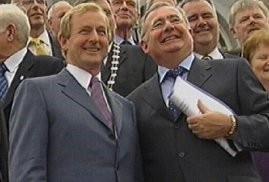Media tax coming to a laptop near you

The government might tax all media - that means websites and radio too - in its campaign to fight our yawning debt. Angela Long considers the possibility.
With water tax and property tax and whatever else the government can think of about to afflict us, something else said to be under consideration is a sort of media tax. This would augment or replace the TV licence (how expensive WAS that advertising campaign – and what results did it get?). And, crucially, it would drag into the net the estimated 20 per cent who watch their laptop and don’t have or don’t bother with TV.
That figure – one in five, or 20% – comes from a survey done by iReach, a Dublin market research company, and released earlier this month. When the question was whether people ever watched videos or streaming on laptops, the figure rose to over 70 per cent.
If the government had trouble getting people to fork out €160 for the pleasure of RTE (and the hanger-on stations that get much of the audience), how will it screw money out of the laptop and tablet community? One possibility is a tax whacked on to the item when it is purchased. We’ll have to ask our learned legal brethren about the feasibility of that.
Communications Minister Pat Rabbitte was sweetly old-fashioned when he answered a question about this in the Dail last month, saying that his department was attempting “to get a handle on the new ‘platforms’ that are there” for television viewing.
It puts one in mind of the judge in England who was reputed to have asked ‘who are The Beatles?' during a court case in the 1960s.
To return to the proposal for a broad media tax, this was mentioned in Fine Gael's platform before the election. And former Minister for Communications Eamon Ryan suggested a 'bandwidth tax' would be more apt in the modern world.The idea is being portrayed as a way to spread the revenue from an entertainment tax, if the TV licence could be called that, across the spectrum of independent as well as state broadcasters and media providers.
This is the relevant phrase from the FG Manifesto:
We will change the TV Licence into a household-based Public Broadcasting Charge applied to all households and applicable businesses regardless of the device they use to access content. We will look a new ways of collection including the possibility of paying in instalments through another utility bill (electricity or telecom), collection by local authorities, the Revenue or a new contract with An Post. This will reduce the cost of collection and widespread evasion and could yield a further €20m per annum.
It all sounds nasty, but there could be a point. It’s no secret that newspapers are generally in a parlous state financially, and the decline in advertising caused by the recession means that many broadcast companies share that sorrow. A 2010 report called Making Good Society from the Carnegie Trust in Britain here claimed that levies for media use are in place in 30 countries ‘and are popular with the general public’.
One might question whether something people have to pay is ever exactly popular – would they protest if the levy were removed? But one concern of that report, and for us all, was the future of a healthy media as a pillar of democracy. The trend is for current and future consumers to read only their special interests in depth, and skin news sites, preferably without paying anything (another report, the US Pew Foundation’s State of the Media, found that fewer than 20% of people would pay for online news).
So to keep decent, rounded, critical news alive, some sort of contribution from the wider society might be essential. No less a figure than German uber-brain Jurgen Habermas has discussed the possibility of state funding for otherwise independent newspapers. It’s just that now, with the government dipping into private pensions and penalising the lowest paid while the well-padded get away with the loot, any new charges are about as popular as a fox in the henhouse.
And how much of that charge would ever make it to media across the board - there is a very pointy question.
